So far, the war in the Gaza Strip has not fulfilled the nightmare of a larger conflict in the Middle East, in which the US and Iran will be the protagonists, but it does imply an even greater diversion of attention from Ukraine, which may not receive help from the US.
A terrifying scenario that is becoming increasingly likely
After the events of the last few days, this danger is gradually taking shape. The already tense atmosphere was further aggravated by the execution of senior Hamas official Saleh Al-Arouri, carried out by drone south of Beirut. The Red Sea is a powder keg. According to the Guardian, the epicenter of the danger is in the Red Sea, where Yemen-based Houthi forces backed by Iran are attacking cargo ships with real or theoretical links to Israel.
The US is trying to offer protection to Western ships traveling in the region by forming a multinational naval coalition “to uphold the fundamental principle of freedom of navigation.” However, despite the pressure on Joe Biden, the US President said he wants to avoid direct military confrontation with the Houthis, fearing an escalation of tensions in the region.
On Sunday, the US Navy carried out an unprecedented intervention at the site of these tensions, killing all the crew members of three Houthi boats that aggressively interfered with the container ship. Yesterday, UK Defense Secretary Grant Shapps said the UK “would not hesitate to take further action” if Houthi attacks continued.
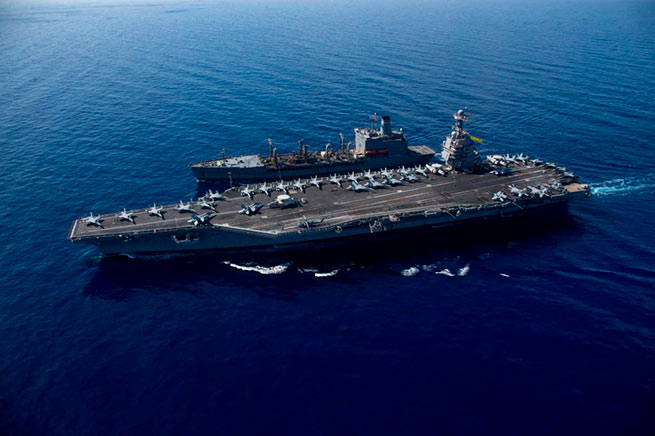
US naval forces took up positions in the Red Sea
Immediate Iranian involvement
Now that Tehran has rejected calls from Washington and London to stop supporting the Houthis, an Iranian destroyer has entered the Red Sea. The Guardian notes that the UK and US, possibly along with another European country, may issue a warning about attacks on military targets in Yemen. Tensions in the Red Sea are already causing casualties and economic losses. But what exactly happened and why are there such great fears about what awaits us in the near future?
Chronicle of tension
In the immediate aftermath of the October 7 massacre in Israel, Houthi leader Abdul Malik al-Badreddin Houthi declared his support for Hamas and said his forces were “ready to move in the hundreds of thousands to join the Palestinian people and confront the enemy.” This statement turned out to be an exaggeration, as the next 30 days of Houthi activity were limited to missile and drone attacks, which were largely intercepted by American and Israeli countermeasures.
However, on November 19, the Houthis used a helicopter to hijack a cargo ship in the Red Sea that was Japanese but ultimately belonged to an Israeli businessman. The Houthis kidnapped the crew and warned that all ships associated with Israel “will become a legitimate target for their armed forces.”
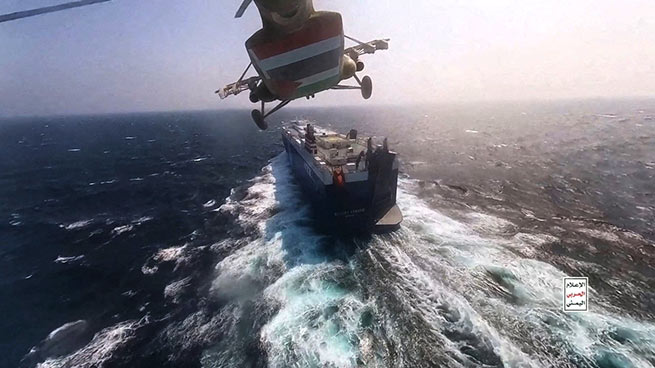
Houthi actions provoke Western military intervention in Yemen
New stage of the crisis
Since then, at least 17 attacks targeting ships the Houthis believe are linked to Israel or its allies, largely without success. So far, the US has refrained from direct confrontation. But last Sunday, US Navy helicopters opened fire on a group of small boats attempting to board a container ship that had sought their protection, Maersk’s Hangzhou.
#BREAKING: #Iran's #Houthi regime in #Ymen confirms that 10 of their terrorists got killed in 3 fast boats sent to hijack Singapore flagged Maersk Hangzhou container ship at #RedSea. They were hunted by means of AGM-114K Hellfires launched by two #USNavy's MH-60S helicopters. pic.twitter.com/TB1ZcyKvnX
— Babak Taghvaee – The Crisis Watch (@BabakTaghvaee1) December 31, 2023
Региональное командование США сообщило, что четыре хуситских катера атаковали датский контейнеровоз Maersk Hangzhou, на помощь были направлены американские военные вертолеты. В результате три из четырех лодок были потоплены, их экипаж утонул
pic.twitter.com/oAZKWUugec— распад и неуважение (@VictorKvert2008) January 1, 2024
And although Washington said its helicopters opened fire in self-defense, the deaths of 10 Houthis marked a new stage in the crisis.
Energy in focus
Safety of shipping in the Red Sea is important to the global economy because it is a major trade route linking Asia with Europe and the United States. The region handles 30% of the world’s container traffic, and any significant threat to its security could negatively impact oil prices and the availability of goods made in Asia in the West. Israel itself is also heavily dependent on Red Sea shipping, with the vast majority of its imports and exports carried out by sea.
Shipping
Seven of the world’s ten largest shipping companies, including BP and Hapag-Lloyd, are not using the Suez Canal or Red Sea due to the crisis. Another shipping giant, Maersk, resumed operations in the region a week ago but suspended them again after the Hangzhou attack.
And while many Western container ships have re-entered the region thanks to US military protection, many others are still using alternative routes. Many of them head from Asia to Europe, circumnavigating the southernmost tip of Africa – a journey that can take up to two weeks.
Worries about prices
Figures released last week by Flexport, a global logistics company, showed that half of all container ships are avoiding the region, which accounts for about 18% of global container volume. This significantly increases costs, which will likely push prices to triple their pre-crisis levels.
Will the crisis get worse?
On Sunday, the Guardian noted that since October 7, “the Middle East has been sliding toward the brink of regional war, and the past week has shown us that the cliff edge that keeps the Middle East from such an abyss could collapse very soon.”
US attacks on Houthi ships are not in themselves decisive. While they represent a significant departure from past Western practice, they are a far cry from striking Houthi bases in Yemen. But if the threat in the Red Sea continues, shipping companies already avoiding the region will likely continue to do so, and others will follow suit.
Oil as a regulator
World oil prices have not yet been hit hard by the crisis and fell last week on belief that the route will reopen. Any sense that the threat is rising again, without an effective exit strategy, could derail the situation in this key economic area.
The Houthis have shown no signs of backing down, recently saying that unless humanitarian aid is allowed into Gaza and Israel does not stop its attacks, they will not stop targeting shipping “even if America manages to mobilize the whole world.” If Sunday’s events don’t change that, the US could ultimately decide to strike targets in Yemen, raising tensions with Iran and risking a wider confrontation – even if Biden doesn’t like it.
Support for Ukraine
In the event of an open conflict with Iran, which is clearly supported by Russia and China, the situation in the world could get out of control. And then the United States will no longer have time to support Ukraine…
The author’s opinion may not coincide with the opinion of the editors.


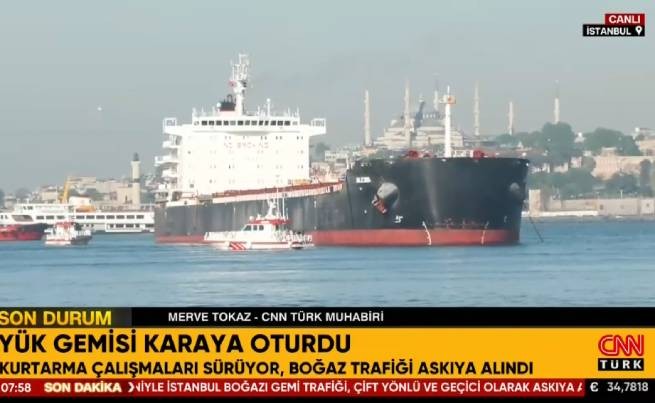
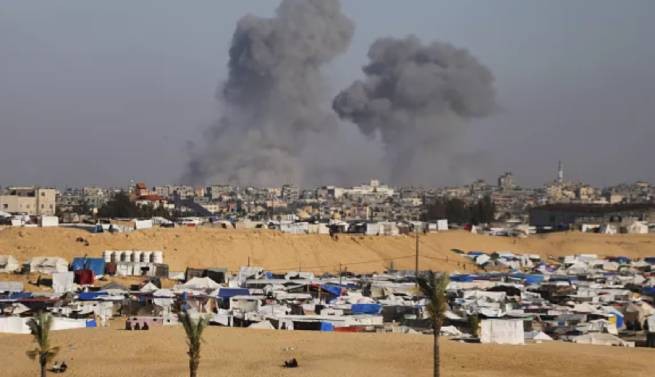

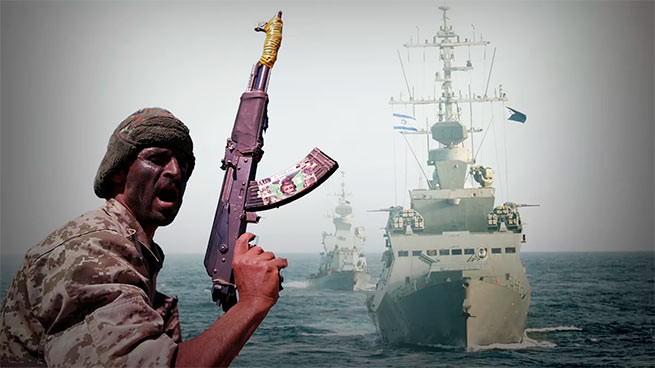

More Stories
Russia: a man fell from the twentieth floor while escaping a fire (video)
Traffic in the Bosphorus Strait is suspended due to the ALEXIS vessel running aground
"Eurovision" starts on May 7, the competition participants paraded along the turquoise path (video)